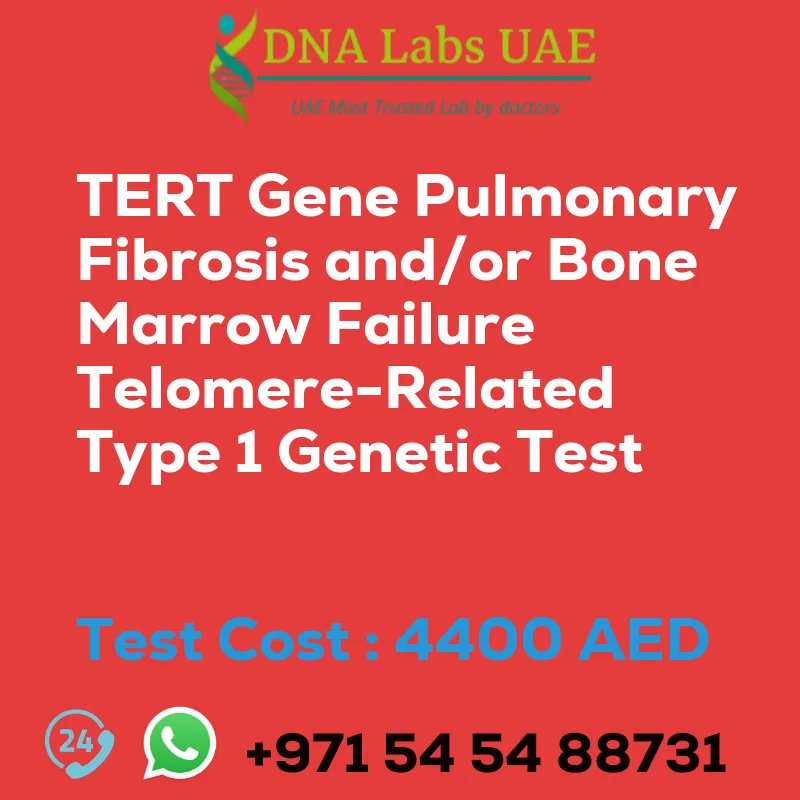TERT Gene Pulmonary Fibrosis and Bone Marrow Failure Telomere-Related Type 1 Genetic Test
Test Name: TERT Gene Pulmonary fibrosis and/or bone marrow failure telomere-related type 1 Genetic Test
Components: Blood or Extracted DNA or One drop Blood on FTA Card
Price: 4400.0 AED
Sample Condition: Blood or Extracted DNA or One drop Blood on FTA Card
Report Delivery: 3 to 4 Weeks
Method: NGS Technology
Test Type: Osteology Dermatology Immunology Disorders
Doctor: Dermatologist
Test Department: Genetics
Pre Test Information: Clinical History of Patient who is going for TERT Gene Pulmonary fibrosis and/or bone marrow failure, telomere-related, type 1 NGS Genetic DNA Test. A Genetic Counselling session to draw a pedigree chart of family members affected with TERT Gene Pulmonary fibrosis and/or bone marrow failure, telomere-related, type 1 NGS Genetic DNA Test gene TERT
Test Details:
The TERT gene is responsible for encoding the telomerase reverse transcriptase enzyme, which is involved in maintaining the length and stability of telomeres, the protective caps at the ends of chromosomes. Mutations in the TERT gene can lead to various telomere-related disorders, including pulmonary fibrosis and/or bone marrow failure.
Pulmonary fibrosis is a condition characterized by the progressive scarring and stiffening of lung tissues, leading to difficulty in breathing. Bone marrow failure, on the other hand, refers to the inability of the bone marrow to produce an adequate amount of blood cells, including red blood cells, white blood cells, and platelets.
NGS (Next-Generation Sequencing) genetic testing is a type of genetic test that can identify mutations or changes in the DNA sequence of the TERT gene. This test can help diagnose telomere-related disorders, such as pulmonary fibrosis and bone marrow failure, that are caused by TERT gene mutations.
By identifying the specific TERT gene mutation, healthcare providers can better understand the underlying cause of these conditions and provide appropriate management and treatment options. Additionally, genetic testing can also help identify individuals who may be at risk of developing these conditions, allowing for early intervention and monitoring.
It’s important to note that genetic testing should be done under the guidance of a healthcare professional or genetic counselor who can provide counseling and support throughout the testing process and help interpret the results.
| Test Name | TERT Gene Pulmonary fibrosis andor bone marrow failure telomere-related type 1 Genetic Test |
|---|---|
| Components | |
| Price | 4400.0 AED |
| Sample Condition | Blood or Extracted DNA or One drop Blood on FTA Card |
| Report Delivery | 3 to 4 Weeks |
| Method | NGS Technology |
| Test type | Osteology Dermatology Immunology Disorders |
| Doctor | Dermatologist |
| Test Department: | Genetics |
| Pre Test Information | Clinical History of Patient who is going for TERT Gene Pulmonary fibrosis and/or bone marrow failure, telomere-related, type 1 NGS Genetic DNA Test. A Genetic Counselling session to draw a pedigree chart of family members affected with TERT Gene Pulmonary fibrosis and/or bone marrow failure, telomere-related, type 1 NGS Genetic DNA Test gene TERT |
| Test Details |
The TERT gene is responsible for encoding the telomerase reverse transcriptase enzyme, which is involved in maintaining the length and stability of telomeres, the protective caps at the ends of chromosomes. Mutations in the TERT gene can lead to various telomere-related disorders, including pulmonary fibrosis and/or bone marrow failure. Pulmonary fibrosis is a condition characterized by the progressive scarring and stiffening of lung tissues, leading to difficulty in breathing. Bone marrow failure, on the other hand, refers to the inability of the bone marrow to produce an adequate amount of blood cells, including red blood cells, white blood cells, and platelets. NGS (Next-Generation Sequencing) genetic testing is a type of genetic test that can identify mutations or changes in the DNA sequence of the TERT gene. This test can help diagnose telomere-related disorders, such as pulmonary fibrosis and bone marrow failure, that are caused by TERT gene mutations. By identifying the specific TERT gene mutation, healthcare providers can better understand the underlying cause of these conditions and provide appropriate management and treatment options. Additionally, genetic testing can also help identify individuals who may be at risk of developing these conditions, allowing for early intervention and monitoring. It’s important to note that genetic testing should be done under the guidance of a healthcare professional or genetic counselor who can provide counseling and support throughout the testing process and help interpret the results. |








